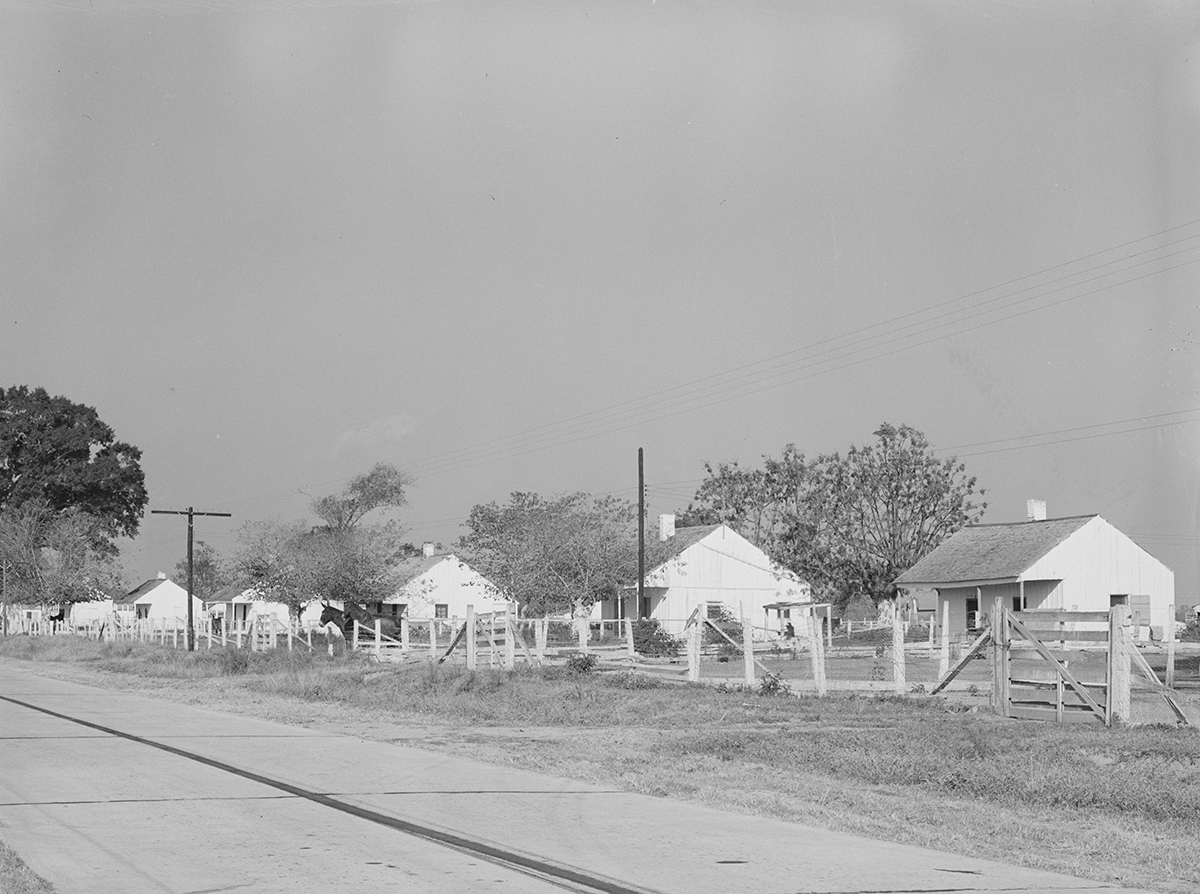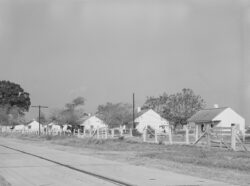Clinton Clark
A civil rights unionist from Pointe Coupee Parish, Clark faced frequent violence in his efforts to organize tenant farmers.

Library of Congress Prints and Photographs Division
Tenant farmer housing on a sugar plantation in Pointe Coupée Parish where labor organizer Clinton Clark was born, 1938. Russel Lee, photographer.
Clinton Clark, born into a sharecropping family in Pointe Coupee Parish in 1903, was an African American organizer for the interracial Louisiana Farmers’ Union (LFU) in the 1930s. An affiliate of the Southern Tenant Farmers’ Union, the LFU assisted Louisiana tenant farmers and sharecroppers in getting their fair share of benefits from the New Deal’s Agricultural Adjustment Administration, which plantation owners actively withheld from them. Clark’s 1942 manuscript, deposited at Howard University and later edited for publication, provides a first-person account of the grueling conditions on Louisiana cotton and sugar cane plantations and chronicles the LFU’s work. His memoir helps illuminate the often-overlooked origins of the post-war civil rights movement among southern African American labor organizations during the Great Depression.
Because Clark sought to overturn the oppressive sharecropping system as well as Jim Crow, white landowners attempted to silence him by killing him, if necessary. Frequently hiding out in woods and swamps to protect himself (a practice historically used by self-emancipated people to evade re-enslavement), he earned the nickname “the Black Ghost of Louisiana.”
Formative Influences
Clark’s memoir reveals how the sharecroppers’ goal of owning their own land and becoming self-sufficient farmers was an impossible dream. This impossibility was thanks to debt peonage laws that bound tenants who ended the harvest owing money to the landowner and their “robberserry” (as Clark referred to the plantation store) to work the land for another year in the same location in an American system of perpetual serfdom. As a child Clark’s family, consisting of seven children and a widowed mother, never had enough food to eat or clothes to wear. His mother worked in the plantation owners’ home every day from six in the morning until ten at night for $1.50 per week. This exploitative domestic labor was a common form of employment among Black women on sharecropping farms. Black children went to school for no more than three months per year, and attendance was not required of them. This structurally under-resourced education ensured that they had little opportunity to escape the predatory sharecropping system.
Seeking other types of employment, in 1931 Clark hopped on freight trains and rode on the tops of box cars alongside many other jobless Americans hoping for work in California. In Sacramento, with the help of the Unemployment Council, an American Communist Party organization, Clark developed public-speaking and organizing skills. His experience in California opened up interracial labor organizing as a strategy to disrupt economic and racial forms of exploitation. It also meant, however, that he would be surveilled by government authorities who viewed him as a potential subversive. He was subversive in the sense that he sought to undermine white power and privilege and gain better conditions for tenant farmers, but he never advocated violence or sought to overthrow the government. In fact, Clark was a religious man—a viewpoint at odds with Marxist ideology.
Religion in Clark’s Life
Religion played a significant role in Clark’s life and was a motivating factor for his organizing. Meetings of the Southern Tenant Farmers’ Union and LFU sometimes resembled church services or religious revivals since they included prayer, hymn-singing, and fiery orations from preachers as well as secular leaders. Clark’s faith gave him strength and motivation, but according to historian Erik Gellman’s reflection on Clark’s memoir he also “wanted to reorient Black workers from a religion focused on obedience and reward in the afterlife to one that aggressively sought to correct injustice on earth.” Unlike many southern white evangelicals, for whom religion was a powerful agent for the status quo, for some African Americans, Christianity was equally as powerful a source of radical ideology, particularly for economic and racial equality.
Role of the Federal Government
With the help of white LFU organizers Gordon McIntire and Clyde Johnson, Clark brought in agents of the federal government to investigate the abuses of the sharecropping system. The presence of federal investigators helped to undermine the power that planters had over tenants. When Clark was jailed and threatened with lynching in Natchitoches in 1940, it was local officials’ fear of federal intervention that saved his life. His allies publicized his arrest across the nation and drummed up a national protest that forced local officials to release him after three weeks, without any charges being filed.
After another stint in jail in Mississippi, Clark returned to New Orleans and wrote his memoir. It made a case for a tenant farmers’ union as the only pathway to freedom and self-sufficiency. It also called out white people who brutally oppressed African Americans. He wrote that no Black men were ever hired for any good jobs because contractors would “catch hell with the mob” of white people. He illuminated the fact that innocent Black people were routinely murdered by whites and that in Louisiana, no white man was ever punished for killing a Black man. The injustice of the system is what motivated him to press on despite the threat of bodily harm.
In 1943 Clark left for New York City, where he ended up in Bellevue Hospital with mental and other health problems. He likely suffered from post-traumatic stress disorder, but his family thought white doctors may have misdiagnosed him—a not uncommon occurrence for the poor and marginalized, especially if authorities considered them troublemakers. Indeed, many civil rights workers suffered similar trauma-related illnesses from the stress of challenging white supremacy. Clark’s family rescued him and brought him back to Louisiana, where, for the last twenty years of his life, he returned to the same labor as his youth: cultivating crops with a wagon and a mule. He died in 1974 in relative obscurity.
Clark is what historians dub a “civil rights unionist,” meaning that his challenge to Jim Crow stemmed from labor organizing. His life’s work shows that the activism of African Americans in the 1930s, rather than being the precursor to the civil rights movement, was part of it. In the end the LFU and Southern Tenant Farmers’ Union were both broken up by local white power structures without having achieved the goal of ending the sharecropping system. However, their attempts to rectify the South’s inequities laid the groundwork for the more famous civil rights movement of the 1950s.
